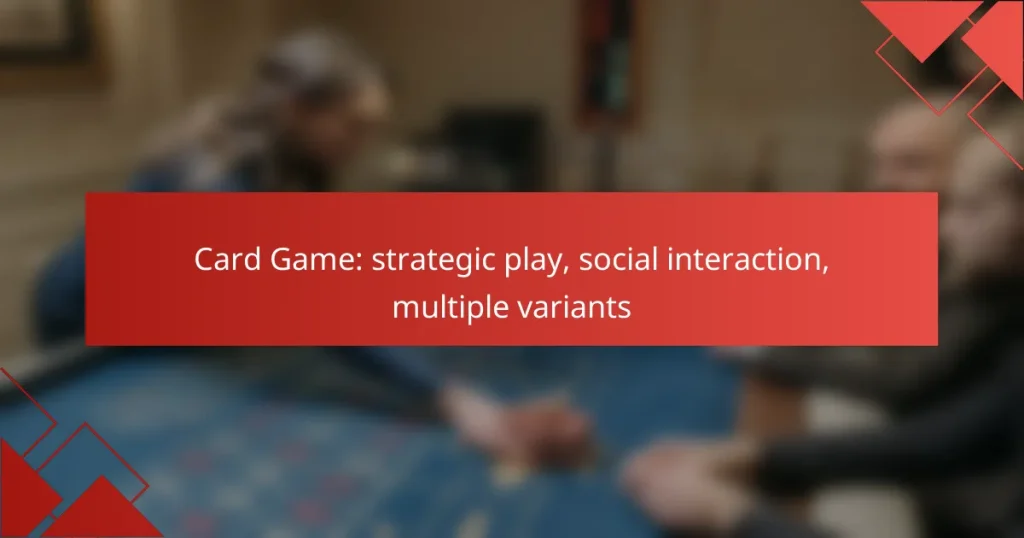Card games offer a unique blend of strategic play and social interaction, requiring players to make complex decisions while adapting to their opponents’ moves. These games foster connections among participants, enhancing communication and collaboration. With numerous variants like Rummy, Whist, Cribbage, and Snap, there is a card game to suit every player’s preference and social setting.

What are the best card games for strategic play?
The best card games for strategic play combine complex decision-making with social interaction. These games often require players to think several moves ahead and adapt their strategies based on opponents’ actions.
Chess
Chess is a classic strategy game that, while played on a board, involves card-like elements in its tactical depth. Each piece has unique movements, and players must anticipate their opponent’s strategies while developing their own. The game emphasizes foresight and planning, making it a staple in strategic play.
To excel at chess, focus on controlling the center of the board and developing your pieces efficiently. Avoid unnecessary pawn moves early on, as they can hinder your position later in the game.
Bridge
Bridge is a trick-taking card game played with a standard deck, typically involving four players in two partnerships. The game requires players to communicate effectively with their partner while also strategizing against their opponents. Mastery of bidding and card play is essential for success.
When playing bridge, pay attention to the bidding process, as it sets the stage for the entire game. Understanding the point count and distribution of cards can significantly enhance your strategic decisions.
Magic: The Gathering
Magic: The Gathering is a collectible card game where players build decks and compete against each other using spells, creatures, and strategies. Each game involves a blend of resource management and tactical combat, requiring players to adapt their strategies based on their opponent’s deck and play style.
To improve in Magic, familiarize yourself with different card types and synergies. Building a balanced deck that can handle various scenarios is crucial, as is understanding the metagame to anticipate opponents’ strategies.
Settlers of Catan
Settlers of Catan is a board game that incorporates card elements through resource management and trading. Players collect resources to build settlements and roads while negotiating trades with others. Strategic placement and resource allocation are key to winning.
Focus on diversifying your resource production early in the game. Building near multiple resource types can provide flexibility and leverage in trades, increasing your chances of success.
Gloomhaven
Gloomhaven is a cooperative board game that features card-driven mechanics, where players take on the roles of mercenaries in a fantasy world. Each character has a unique deck of cards that dictate their actions, requiring strategic planning and teamwork to overcome challenges.
In Gloomhaven, communication with your team is vital. Coordinate your actions to maximize efficiency and mitigate risks, as the game’s scenarios often require players to adapt their strategies based on evolving threats and objectives.

How do card games enhance social interaction?
Card games significantly enhance social interaction by bringing people together in a shared activity that encourages engagement and collaboration. Through gameplay, participants develop connections and improve their communication skills, making these games a valuable tool for social bonding.
Encourages teamwork
Many card games require players to work together towards a common goal, fostering a sense of teamwork. For example, cooperative games like “The Crew” or “Hanabi” necessitate players to strategize collectively, which strengthens their ability to collaborate and support one another.
When players engage in team-based card games, they learn to appreciate each other’s strengths and weaknesses, which can lead to improved group dynamics. This experience can translate into better teamwork in other areas of life, such as work or community projects.
Facilitates communication
Card games often involve discussions about strategies, rules, and decisions, which naturally enhances communication skills. Players must articulate their thoughts clearly and listen to others, creating an environment where open dialogue is encouraged.
Moreover, games that involve bluffing or reading opponents, like “Poker” or “Coup,” require players to pay attention to non-verbal cues and body language, further honing their communication abilities. This practice can lead to more effective interactions in everyday situations.
Builds friendships
Playing card games can help forge lasting friendships by providing a relaxed setting for social interaction. The shared experiences and memories created during gameplay often lead to deeper connections among players.
Regular game nights can become a tradition, allowing friends to bond over their favorite games and create a sense of community. Additionally, meeting new people through card games can expand one’s social circle, introducing players to diverse perspectives and backgrounds.

What are popular variants of card games in the UK?
In the UK, popular variants of card games include Rummy, Whist, Cribbage, and Snap. Each game has its own unique rules and strategies, appealing to different types of players and social settings.
Rummy
Rummy is a group of matching-card games that involve forming sets or runs of cards. Players aim to collect cards that can be grouped together, typically in sets of three or four of a kind or sequences of three or more cards in the same suit.
Common variants include Gin Rummy and Indian Rummy, each with slightly different rules. Players should focus on discarding high-value cards to minimize points if another player goes out, making strategic play essential.
Whist
Whist is a classic trick-taking game played with a standard deck of cards, typically by four players in two partnerships. The objective is to win as many tricks as possible, with players following suit if able.
Understanding the importance of communication and strategy between partners is crucial. Players should pay attention to the cards played and anticipate opponents’ moves to maximize their chances of winning tricks.
Cribbage
Cribbage is a unique card game that combines elements of strategy and chance, played with two to four players. The game involves creating combinations of cards for points, with a special scoring board used to track progress.
Players should be mindful of the cards they keep and discard, as well as the potential points from their opponent’s crib. Effective scoring and strategic play can significantly influence the outcome of the game.
Snap
Snap is a fast-paced game where players aim to “snap” and claim a pile of cards when they see two cards of the same rank. It is typically played with a standard deck and can accommodate multiple players.
Quick reflexes and keen observation are key to success in Snap. Players should be aware of their surroundings and ready to react swiftly, as the game can change rapidly with each turn.

What criteria should you consider when choosing a card game?
When selecting a card game, consider factors such as player count, game duration, and complexity level. These criteria will help you find a game that fits your group’s preferences and the occasion.
Player count
The number of players is crucial when choosing a card game, as many games are designed for specific group sizes. Some games work well with just two players, while others shine with larger groups, typically ranging from four to eight players.
For example, games like Uno are great for family gatherings, accommodating 2 to 10 players, while games like Poker are often best with 4 to 10 players. Always check the game’s specifications to ensure it suits your group size.
Game duration
Game duration can significantly impact your choice, especially if you have limited time. Some card games can be played in under 30 minutes, while others may take several hours to complete.
For quick play, look for games like Sushi Go, which typically lasts around 15-20 minutes. If you prefer longer, strategic sessions, consider games like Magic: The Gathering, which can last an hour or more, depending on the format and number of players.
Complexity level
The complexity level of a card game affects how quickly players can learn and enjoy it. Some games are straightforward, making them ideal for casual play, while others require more strategic thinking and time to master.
For instance, games like Go Fish are easy to learn and suitable for all ages, while games like Dominion involve more intricate strategies and may take longer to grasp. Assess your group’s familiarity with card games to choose an appropriate complexity level.


